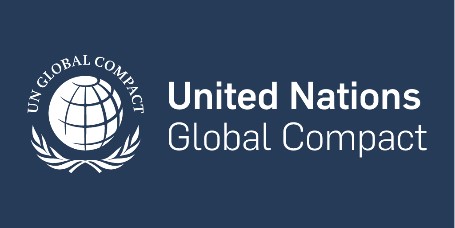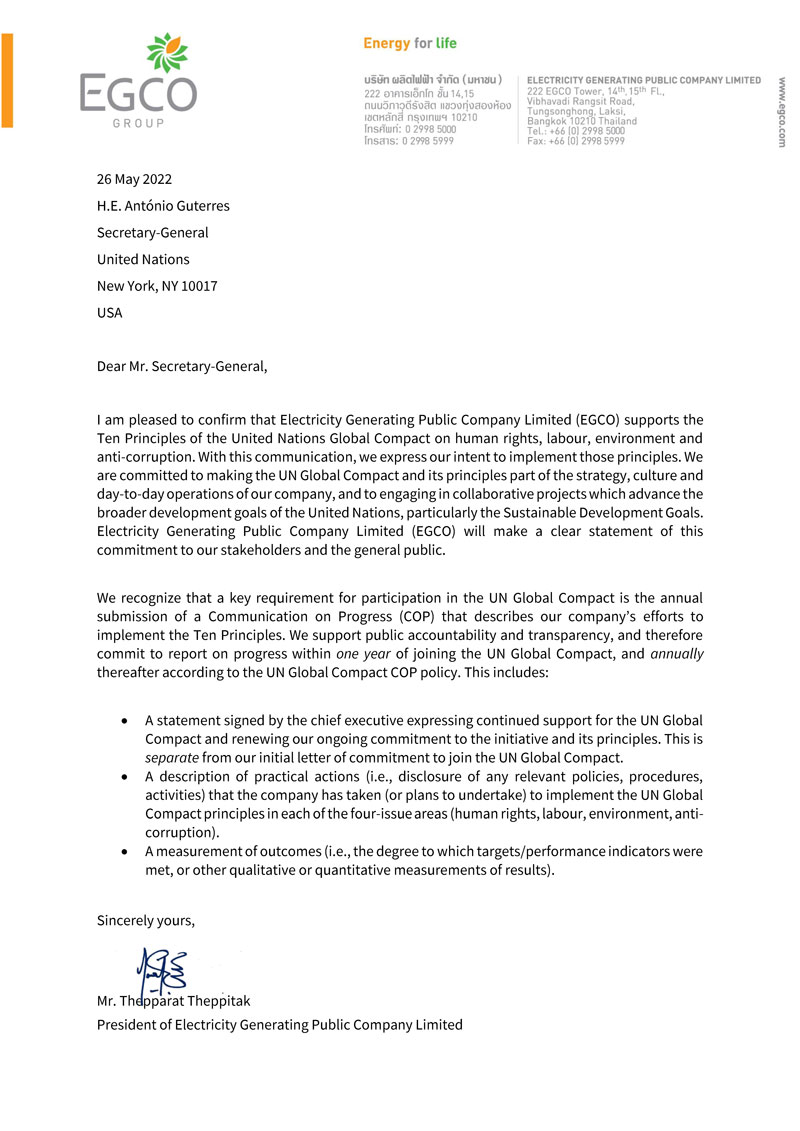การสนับสนุนต่อภาคส่วนต่าง ๆ
[GRI 2-28 (2021)]
ด้วยเจตนารมณ์ที่จะเป็นพลเมืองที่ดีของสังคม เอ็กโก กรุ๊ป ให้การสนับสนุนหน่วยงานหรือภาคส่วนต่าง ๆ โดยมีวัตถุประสงค์เพื่อสร้างพันธมิตรในการประสานและทำงานร่วมกันในการสนับสนุนและขับเคลื่อนองค์กรที่สร้างคุณประโยชน์ให้แก่สังคมและประเทศ ทั้งนี้ การสนับสนุนดังกล่าวจะสอดคล้องกับยุทธศาสตร์หรือนโยบายของ เอ็กโก กรุ๊ป และหน่วยงานที่ เอ็กโก กรุ๊ป สนับสนุน ซึ่งช่วยส่งเสริมการเติบโตและความยั่งยืนของสองหน่วยงานและสังคมโดยรวม ในการสนับสนุนภาคส่วนต่าง ๆ เพื่อให้การสนับสนุนเป็นไปตามกฎหมาย โปร่งใส สามารถตรวจสอบได้ และสอดคล้องกับความมุ่งมั่นขององค์กรที่ “ไม่ยอมรับการคอร์รัปชันในทุกรูปแบบทั้งทางตรงและทางอ้อม” เอ็กโก กรุ๊ป ได้กำหนดแนวทางในการบริจาคและการให้การสนับสนุน หรือระเบียบในการเข้าร่วมเป็นสมาชิกขององค์กรภายนอกต่าง ๆ ไว้เป็นลายลักษณ์อักษร
ประเด็นที่ เอ็กโก กรุ๊ป ให้การสนับสนุน
เครือข่ายภาคพลังงาน และความยั่งยืน
| เครือข่าย | ข้อมูลของเครือข่ายที่สนับสนุน | คุณค่า และการมีส่วนร่วมของเอ็กโก กรุ๊ป |
|---|---|---|
|
สมาคมอุตสาหกรรมไฟฟ้าแห่งประเทศไทย (TESIA)  |
สมาคมอุตสาหกรรมไฟฟ้าแห่งประเทศไทย (TESIA) ก่อตั้งขึ้นเพื่อส่งเสริมความก้าวหน้าและความสามัคคีในอุตสาหกรรมไฟฟ้า เป้าหมายหลักประกอบด้วยการส่งเสริมการแลกเปลี่ยนความรู้ทางเทคโนโลยีและความเชี่ยวชาญด้านวิศวกรรม การสร้างความสัมพันธ์อันดีและความสามัคคีระหว่างสมาชิก การปกป้องผลประโยชน์และความมั่นคงทางวิชาชีพในการผลิตและจำหน่ายไฟฟ้า การดำเนินกิจกรรมที่เป็นประโยชน์ต่อสาธารณะ และการพัฒนาวิศวกรมวิชาชีพเพื่อประโยชน์สาธารณะ |
|
|
สถาบันปิโตรเลียมแห่งประเทศไทย (PTIT)  |
สถาบันปิโตรเลียมแห่งประเทศไทย (PTIT) มุ่งหวังที่จะส่งเสริมการพัฒนาอย่างยั่งยืนของอุตสาหกรรมปิโตรเลียม ปิโตรเคมี พลังงาน และอุตสาหกรรมที่เกี่ยวข้องของประเทศไทย โดยให้บริการข้อมูล ส่งเสริมกาสื่อสารระหว่างผู้มีส่วนได้เสีย (ภาครัฐ อุตสาหกรรม สถาบันการศึกษา) สนับสนุนการวิจัยและพัฒนา ส่งเสริมนโยบายที่เหมาะสม ส่งเสริมความรับผิดชอบต่อสังคม และอำนวยความสะดวกในการพัฒนาทรัพยากรบุคคลภายในกลุ่มอุตสาหกรรม |
|
|
สมาคมผู้ผลิตไฟฟ้าเอกชน (APPP)  |
สมาคมผู้ผลิตไฟฟ้าเอกชน (APPP) เป็นองค์กรในธุรกิจไฟฟ้าที่เป็นตัวแทนของกลุ่มผู้ผลิตไฟฟ้าเอกชนที่มีธรรมาภิบาล มีความเชี่ยวชาญและความรู้ในธุรกิจไฟฟ้าและพลังงาน มีวิสัยทัศน์เดียวกันในการขับเคลื่อนความเพียงพอของการจัดหาพลังงาน การใช้พลังงานอย่างมีประสิทธิภาพ และพัฒนาเศรษฐกิจและสังคมอย่างยั่งยืน ตลอดจนเป็นตัวแทนของผู้ผลิตไฟฟ้าเอกชนในการให้ความรู้ ประสบการณ์ แบ่งปันมุมมอง แสดงความคิดเห็น และเสนอแนะด้านพลังงาน |
|
|
กลุ่มอุตสาหกรรมผู้ผลิตไฟฟ้าแห่งประเทศไทย  |
กลุ่มอุตสาหกรรมผู้ผลิตไฟฟ้าแห่งประเทศไทย เป็นส่วนหนึ่งของสภาอุตสาหกรรมแห่งประเทศไทย (ส.อ.ท.) ซึ่งมีวัตถุประสงค์เพื่อมุ่งเสริมสร้างความเข้มแข็งให้กับอุตสาหกรรมผู้ผลิตไฟฟ้าภายในประเทศ และส่งเสริมความร่วมมือด้านการวิจัย การพัฒนาเทคโนโลยี และคุณภาพผลิตภัณฑ์ให้สอดคล้องกับความต้องการของผู้ใช้ นอกจากนี้ยังสนับสนุนโครงการต่างๆ ที่มุ่งพัฒนาคุณภาพชีวิต สังคม และสิ่งแวดล้อม รวมถึงสนับสนุนนโยบายเพื่อการพัฒนาที่ยั่งยืนขององค์กรและประเทศไทย |
|
|
สภาระบบไฟฟ้าขนาดใหญ่ระหว่างประเทศ (CIGRE)  |
สภาระบบไฟฟ้าขนาดใหญ่ระหว่างประเทศ (CIGRE) เป็นสมาคมระดับโลกที่ส่งเสริมความร่วมมือและการแบ่งปันความรู้ในทุกด้านของระบบพลังงานไฟฟ้า สมาคมนี้รวมผู้เชี่ยวชาญจากกว่า 90 ประเทศเข้าด้วยกันผ่านกลุ่มทำงาน กิจกรรมระดับนานาชาติ และสิ่งพิมพ์ต่างๆ เพื่อพัฒนาการจัดหาไฟฟ้าอย่างยั่งยืน CIGRE เป็นแหล่งทรัพยากรของความเชี่ยวชาญทางเทคนิคชั้นนำในอุตสาหกรรมพลังงานไฟฟ้า |
|
|
หอการค้าไทย  |
หอการค้าไทย มีวัตถุประสงค์เพื่ออำนวยความสะดวกแก่ธุรกิจและการค้า รวมถึงทำหน้าที่เป็นหน่วยงานกลางประสานงานระหว่างภาครัฐและภาคเอกชน เพื่อส่งเสริมธุรกิจและการค้าของประเทศไทย และปกป้องผลประโยชน์ทางการค้าของประเทศไทยอย่างเท่าเทียมและเป็นหุ้นส่วนที่เท่าเทียมกับประเทศอื่นๆ เพื่อเป็นช่องทางที่ดีในการรับและแลกเปลี่ยนแนวปฏิบัติที่ดีที่สุดทั้งในด้านธุรกิจและเศรษฐกิจ |
|
|
สภาอุตสาหกรรมแห่งประเทศไทย (FTI)  |
สภาอุตสาหกรรมแห่งประเทศไทย (FTI) มุ่งมั่นที่จะส่งเสริมความสามารถในการแข่งขันและความยั่งยืนของอุตสาหกรรมไทย โดยทำงานเพื่อเป็นตัวแทนของผู้ผลิต ขับเคลื่อนความก้าวหน้าทางอุตสาหกรรม ให้คำปรึกษาแก่รัฐบาล สนับสนุนสมาชิก ส่งเสริมความร่วมมือ และส่งเสริมการเติบโตอย่างยั่งยืนผ่านนวัตกรรมและการมีส่วนร่วมระดับโลก |
|
|
องค์กรธุรกิจเพื่อการพัฒนาอย่างยั่งยืน (TBCSD)  |
จากภาคธุรกิจ TBCSD เปิดเวทีสำหรับบริษัทต่าง ๆ ในการแบ่งปันความรู้และสนับสนุนสถานะทางธุรกิจ ควบคู่ไปกับการทำงานร่วมกับรัฐบาลและภาคส่วนอื่น ๆ |
|
|
สมาคมบริษัทจดทะเบียนประเทศไทย  |
สมาคมบริษัทจดทะเบียนไทย (TLCA) ก่อตั้งขึ้นใน ปี 2530 เป็นองค์กรไม่แสวงหาผลกำไรสำหรับบริษัทจดทะเบียนในตลาดหลักทรัพย์แห่งประเทศไทย (SET) และตลาดหลักทรัพย์เอ็ม เอ ไอ สมาคมฯ ส่งเสริมการหารือเกี่ยวกับกฎระเบียบ การกำกับดูแลกิจการ และการดำเนินงานด้านความยั่งยืน เปิดโอกาสให้สร้างเครือข่ายผ่านชมรมต่าง ๆ จัดอบรมผู้บริหาร และร่วมมือกับหน่วยงานกำกับดูแลในตลาดทุนไทย |
|
|
มูลนิธิสถาบันสิ่งแวดล้อมไทย (TEI)  |
สถาบันสิ่งแวดล้อมไทย (TEI) ก่อตั้งขึ้นในปี 2536 สถาบันฯ มุ่งมั่นที่จะทำงานอย่างใกล้ชิดกับพันธมิตรต่าง ๆ อาทิ ภาคเอกชน หน่วยงานภาครัฐ ชุมชนท้องถิ่น ภาคประชาสังคม สถาบันการศึกษา และองค์กรระหว่างประเทศ เพื่อการอนุรักษ์ทรัพยากรธรรมชาติและสร้างความสมดุลของสิ่งแวดล้อม ซึ่งเป็นรากฐานของความยั่งยืนทั้งในระดับโลกและระดับประเทศ บทบาทหลักของสถาบันฯ ได้แก่ การให้คำปรึกษาด้านนโยบายสิ่งแวดล้อมระดับชาติ การพัฒนาองค์ความรู้และมาตรฐานด้านสิ่งแวดล้อม การเสริมสร้างศักยภาพในการจัดการทรัพยากรอย่างยั่งยืน การส่งเสริมความร่วมมือและเครือข่ายด้านสิ่งแวดล้อม การเผยแพร่ข้อมูลด้านสิ่งแวดล้อมสู่สาธารณะ และการส่งเสริมธรรมาภิบาลในการดำเนินงาน |
|
|
สมาคมเครือข่ายโกลบอลคอมแพ็กแห่งประเทศไทย (GCNT)  |
สมาคมเครือข่ายโกลบอลคอมแพ็กแห่งประเทศไทย (GCNT) เป็นเครือข่ายระดับท้องถิ่นของข้อตกลงโลกแห่งสหประชาชาติ (United Nations Global Compact Network) ที่สนับสนุนธุรกิจไทยในการดำเนินงานให้สอดคล้องกับหลักการ 10 ประการของข้อตกลงโลกแห่งสหประชาชาติ (UN Global Compact) ในด้านสิทธิมนุษยชน แรงงาน สิ่งแวดล้อม และการต่อต้านคอร์รัปชัน รวมถึงการมีส่วนร่วมบรรลุเป้าหมายการพัฒนาที่ยั่งยืน (SDGs) GCNT อำนวยความสะดวกในการแบ่งปันความรู้ ส่งเสริมการดำเนินธุรกิจอย่างมีความรับผิดชอบ และส่งเสริมความร่วมมือระหว่างบริษัท องค์การสหประชาชาติ รัฐบาล องค์กรไม่แสวงหาผลกำไร และสถาบันการศึกษาในประเทศไทย เพื่อขับเคลื่อนการพัฒนาที่ยั่งยืน |
|
|
เครือข่ายคาร์บอนนิวทรัลประเทศไทย (TCNN) โดย องค์การบริหารจัดการก๊าซเรือนกระจก (องค์การมหาชน)  |
เครือข่ายคาร์บอนนิวทรัลประเทศไทย (TCNN) โดย องค์การบริหารจัดการก๊าซเรือนกระจก (องค์การมหาชน) เป็นโครงการความร่วมมือที่จัดตั้งขึ้นโดยองค์การบริหารจัดการก๊าซเรือนกระจก (อบก.) โดยเชื่อมโยงภาคเอกชน หน่วยงานภาครัฐ และชุมชนท้องถิ่น เพื่อส่งเสริมการลดการปล่อยก๊าซเรือนกระจกและขับเคลื่อนการเติบโตอย่างยั่งยืนสู่สังคมที่เป็นมิตรต่อสภาพภูมิอากาศ โดยมุ่งสู่เป้าหมายการปล่อยก๊าซสุทธิเป็นศูนย์ตามเป้าหมายระดับชาติและระดับนานาชาติ |
|
|
Thailand Bio-Diversity Network (B-DNA) Alliance  |
Thailand Bio-Diversity Network Alliance (B-DNA) ก่อตั้งขึ้นโดยความร่วมมือระหว่างสหภาพนานาชาติเพื่อการอนุรักษ์ธรรมชาติ (IUCN) และบริษัทเอกชน วัตถุประสงค์หลักคือการเสริมสร้างบทบาทของภาคเอกชนในการอนุรักษ์ความหลากหลายทางชีวภาพของประเทศไทย และสนับสนุนเป้าหมายการพัฒนาที่ยั่งยืน (SDGs) และเป้าหมายด้านความหลากหลายทางชีวภาพของไอจิ (Aichi Biodiversity Targets) B-DNA ทำหน้าที่เป็นพื้นที่สำหรับบริษัทต่างๆ เพื่อเพิ่มการรับรู้และศักยภาพด้านความยั่งยืน สร้างเครือข่าย และร่วมมือกันในโครงการอนุรักษ์ต่างๆ ทั่วประเทศ |
|
|
Science Based Targets Initiatives (SBTi)  |
สนับสนุนเศรษฐกิจที่มีการปล่อยก๊าซเรือนกระจก Science Based Targets Initiative (SBTi) เป็นองค์กรระดับโลกที่ส่งเสริมให้ธุรกิจและสถาบันการเงินกำหนดเป้าหมายการลดการปล่อยก๊าซเรือนกระจกที่ท้าทายให้สอดคล้องกับวิทยาศาสตร์ด้านสภาพภูมิอากาศ SBTi กำหนดและส่งเสริมแนวปฏิบัติที่ดีที่สุดในการกำหนดเป้าหมายตามหลักวิทยาศาสตร์ พร้อมนำเสนอมาตรฐาน เครื่องมือ และแนวทางเพื่อช่วยให้องค์กรต่าง ๆ กำหนดเป้าหมายอย่างสอดคล้องกับข้อตกลงปารีสในการจำกัดภาวะโลกร้อน SBTi ประเมินและตรวจสอบเป้าหมายอย่างเป็นอิสระ มอบแนวทางที่ชัดเจนสำหรับบริษัทต่าง ๆ ในการลดคาร์บอนและทธิเป็นศูนย์ |
|
เครือข่ายด้านความยั่งยืนในระดับสากล

เอ็กโก กรุ๊ป เข้าร่วมเป็นสมาชิกข้อตกลงโลกแห่งสหประชาชาติ (UN Global Compact) ในปี 2565 เพื่อสนับสนุนหลักการ 10 ประการของ UNGC ที่ครอบคลุมประเด็นทางด้านสิทธิมนุษยชน มาตรฐานแรงงาน สิ่งแวดล้อม และการต่อต้านการทุจริต ตลอดจนได้จัดส่งรายงานความก้าวหน้าประจำปี (Communication on Progress: CoP) ที่สอดคล้องกับการรายงานความยั่งยืนของบริษัทให้แก่ UNGC เพื่อแสดงความมุ่งมั่นและผลการดำเนินงานที่สอดคล้องกับหลักการ 10 ประการ และ SDG Goals
หนังสือแสดงความมุ่งมั่นในการสนับสนุนหลักการ 10 ประการของ UNGC และ SDG Goals

